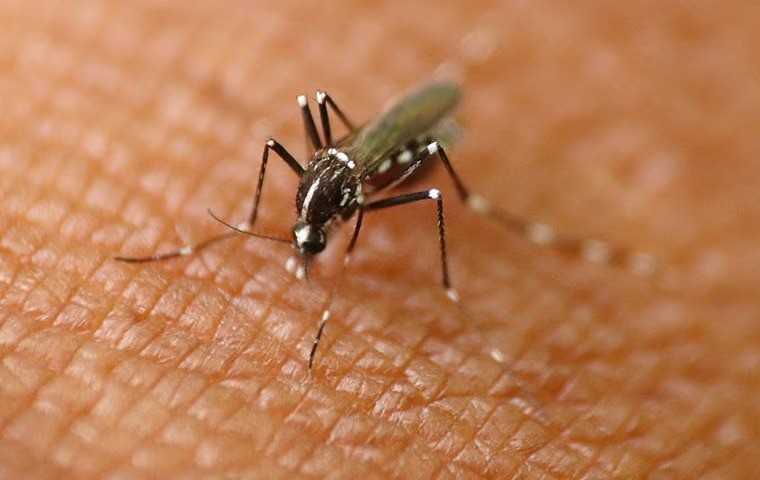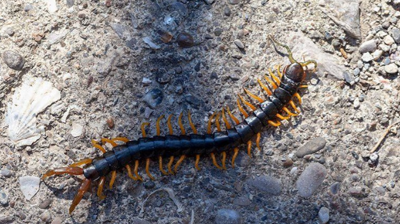Your Ultimate Guide To Mosquito Prevention And Control In Longview

Many things in this world are necessary, yet not always a fun part of life. For example, plants, flowers, and our gardens need rain, but getting caught in a rainstorm without an umbrella is not a pleasant experience. Humans have the incredible ability to adapt, and over the centuries, we have developed solutions to protect us from the rain and the effects of rain showers.
Mosquitoes are like rain; they are a necessary part of our ecosystem, yet we want to avoid interacting with them when possible. If mosquitoes are bothering you and causing you to run inside as if trying to dodge an incoming thunderstorm, you need mosquito control in Longview from Gecko Pest Control. For over 20 years, our family-owned and operated company has shielded families from the ravaging effects of a mosquito infestation on their property. Numerous awards like the Hometown Best award, which we have earned for over ten years, the 2016 Small Business Of The Year award, and the two-time Better Business Bureau Award for Excellence nominee prove our commitment to quality pest control and excellent customer service. Although we are honored to have received these recognitions, we are most proud of our 4.9-star Google ranking from satisfied customers.
You probably found this article because you cannot enjoy the outdoors around your Longview home and need a solution. Please keep reading to learn about mosquitoes, how to deter future invasions, and what you need to do to end the current problem.
About The Mosquito Life Cycle
Although you may not think it is necessary to learn about the mosquito life cycle, this information will help you understand why you have a problem on your property. Before we get into the mechanics, let's learn about these flying pests.
Mosquitoes are insects that have six long legs with tiny claws at the end of each foot. They have a three-part body (head, thorax, and abdomen), wings, and two antennae; like all members of the Phylum Anthtropoda, mosquitos have an external skeleton (exoskeleton). Although it hurts when a mosquito attacks, the pain you sense is not from a stinger but rather from a mouthpart known as a proboscis.
Unlike bed bugs, fleas, and ticks, mosquitoes do not require blood meals to survive, but their diet consists of nectar and plant juices. Why do mosquitoes bite people? Mosquitoes draw blood only for egg production; thus, only female mosquitoes bite and only do so when fertilized. (A male mosquito's proboscis cannot penetrate the skin.) After a female mosquito mates, it flies around for a host to supply a blood meal for the protein, amino acids, iron, and other nutrients necessary to produce eggs. The mosquito hones in on its victim once it senses body heat, sweat, or carbon dioxide.
After obtaining blood, the female flies from its host to find a suitable location for the eggs. Since mosquito development requires water, it seeks stagnant water in ponds, lake inlets, and swamps. In urban areas, mosquitoes deposit eggs in unattended bird baths, discarded tires, potted plants, clogged gutters, and poorly draining ditches.
After a few days or months (depending upon weather conditions), the eggs hatch, and larvae emerge. These worm-like, legless creatures wiggle around in the water slightly below the water's surface and feed on floating organic plant and animal matter for the next several days. During the next five or more days, they will shed their exoskeleton three or four times as their bodies expand.
Once the larval stage is complete, the mosquito's body forms a cocoon-like appearance with a curved tail. The mosquito does not eat at this stage but floats on the water's surface while its body develops. Larvae are known as "wigglers" because of their movement in the water, and in the same way, pupae are known as "tumblers" since they get pulled underwater whenever there is a disturbance.
After two to three days, the mosquito emerges from its cocoon-like structure as an adult mosquito. It rests on its former cocoon habitat while its wings harden. Once its wings are ready, it flies away, mates, and searches for its first blood meal (females). Although temperature and weather conditions may extend the life cycle, a mosquito generally progresses from egg to mature mosquito in seven to ten days.
The mosquito control servicefrom Gecko Pest Control stops mosquitos at all life cycle stages.
Mosquitoes Are Considered The Most Dangerous Insect
This headline may surprise you because we think snakes or other animals are deadlier, but according to the Centers for Disease Control (CDC), mosquitoes cause over 700,000 deaths worldwide. How can these 1/4 to 3/8-inch insects hurt so many people?
When the antennae of a mosquito detects carbon dioxide, body heat, body odor, or sweat, it lands and uses the claws on its feet to attach itself to its new host. Next, it penetrates the skin with its mouthparts to draw blood. To promote blood flow, temporarily suppress the host's immune system, and lubricate its mouthpart, it injects saliva into the host while it feeds. This exchange of body fluids is what makes a mosquito deadly. When a mosquito feeds on an infected host, viruses, bacteria, or parasitic worms enter its body and later migrate to the saliva glands. The next time the mosquito feeds on another host, it passes any disease-causing organisms in its saliva to the new host.
Although there are many mosquito species worldwide, problematic ones in our area are the culex and Asian tiger (Aedes) species. Culux mosquitoes have a grey body with iridescent white, silver, green or blue scales. These mosquitoes are active at dusk and dawn. Asian tiger mosquitos have black and white striped bodies and are active throughout the day.
Both species spread the following diseases:
- West Nile virus
- Dengue
- Chikungunya
- Encephalitis
- Tularemia
Most people infected with one of these diseases do not experience symptoms and those who do generally present flu-like symptoms.
In recent years, the West Nile virus has gained attention because it causes more illnesses in the United States than other mosquito-borne diseases. Like the other illnesses on our list of diseases caused by mosquitoes, eight in ten infected with the West Nile virus do not experience symptoms. Of the two in ten who present symptoms, one in five have body aches, fever, rashes, joint pain, etc. Most recover completely, although some may experience weakness and fatigue for several weeks or months. About one in 150 develop brain and spinal cord swelling from a West Nile virus infection. Inflammation generally occurs in those over 60 years with additional medical complications (cancer, diabetes, hypertension, etc.). If you experience flu-like conditions after a mosquito bite, consult your doctor.
Gecko Pest Control provides home pest control in Longview to reduce the mosquito population around your home, thus minimizing the risk of contracting a disease.
The Best Mosquito Prevention Tips While Out And About
Mosquitoes are everywhere, but that does not mean you need to stay barricaded inside your home. These suggestions will help keep mosquitoes away while you go about your outdoor activities:
- Keep body parts covered.
- Apply an EPA-approved mosquito repellent.
- Treat clothing with 0.5% permethrin.
- Wear loose-fitting and lightly-colored pants and long-sleeved shirts.
- Avoid the outdoors during the dusk and dawn hours.
Do not exercise outdoors during hours of peak mosquito activity.
Remove items that collect water; provide drainage to gutters, ditches, and low-lying areas around your Longview property. If your subdivision has a retention pond, suggest they add a sprinkler system to keep the water stirred.
When a Gecko Pest Control technician inspects your property, we can provide additional tips for your situation.
The Very Best Way To Keep Mosquitoes Away From Your Home
While these tips will help deter mosquitoes, the best way to protect your family is to secure Longview mosquito control services from Hometown Pest Control Company. We will dispatch a trained technician to survey your property to identify mosquito hot spots and attractants.
Next, we treat bushes, vegetation, and other potential mosquito breeding locations with precision using our backpack fogging system. The environmentally friendly product eliminates the larvae, pupae, and adult mosquitoes, destroys their eggs, and significantly reduces the mosquito population surrounding your home. You will notice immediate results from our backpack fogger treatment.
Because of our milder weather, mosquitoes are always active in Texas. For those wanting maximum protection, we offer the Inzecto trap system. We place the snares in strategic locations to lure egg-laying females. The mosquitoes enter, land on netting, and drop their eggs in the stale water laces with an insecticide that kills the larva when they hatch. While the mosquito is on the mesh, a negatively charged mosquito-killing fungus transfers to the mosquito's positively charged body. The mosquito leaves the trap and spreads the fungus to other mosquitoes at the breeding locations, ultimately killing them.
Whether you want seasonal relief or the ultimate year-round protection, Gecko Pest Control has it all. Contact us today to request a free quote and start your service. Remember, Gecko Pest Control is your hometown pest control company.
What Our Customers Are Saying
-
“Gecko is the best pest control company I have used”- Philip J.
-
“Excellent work and does amazing with our animals, who like to join him as he takes care of our home!”- Cagney C.
-
“My neighbor and I had a pest problem found gecko pest control. Reviews looked good so decided to check them out and they came out the following day.”- Seth C.
-
“He is funny, professional, and personable.”- Rosa E.
-
“So down to earth and you can definitely tell he loves people and what he does!”- Latasha H.
-
“Landen does a great job handling any of our needs or concerns.”- Sean G.
-
“If you're looking for a reliable pest control service, these guys will get you fixed up in no time.”- Ray C.
-
“Enjoy his company, and his professionalism.”- Mary M.






